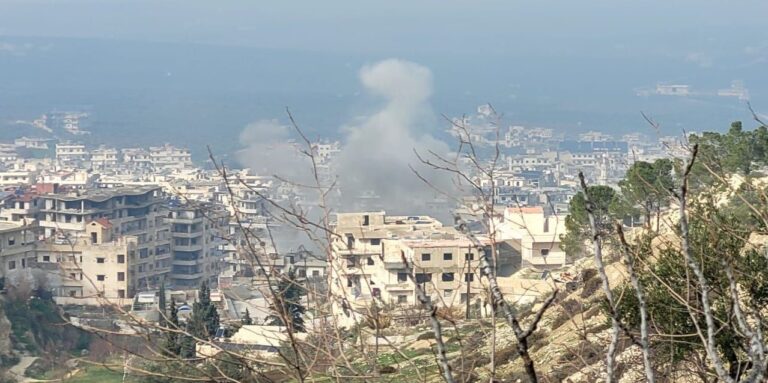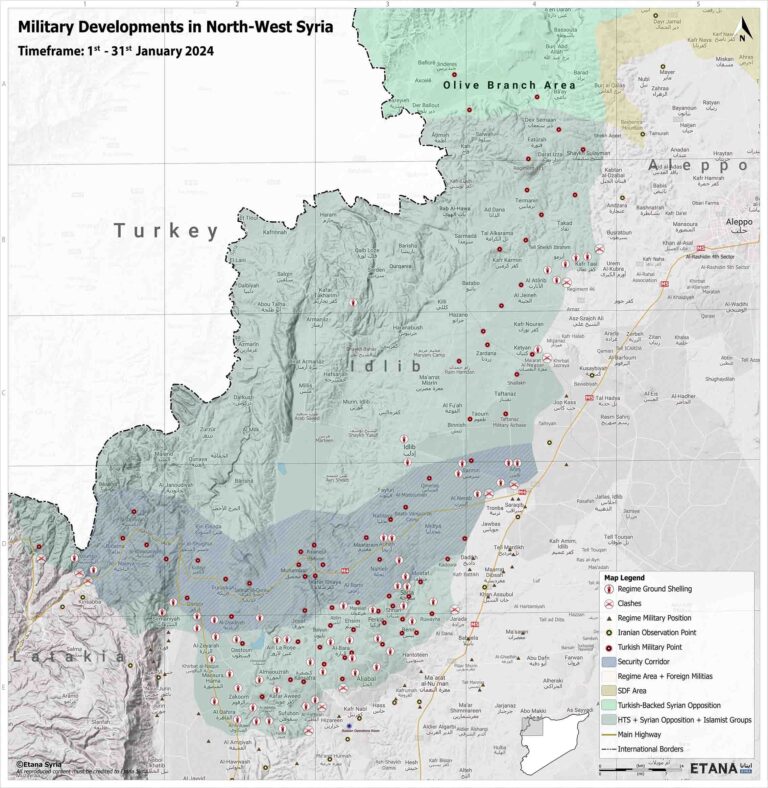The rampant divisions and organizational dysfunction within Hay’at Tahrir al-Sham (HTS) erupted further into the public eye in recent weeks, with senior figures openly denouncing a months-long arrest campaign pursued by commander Abu Muhammad al-Jolani. This growing anger has forced al-Jolani’s hand, spurring the release of most prisoners and videos broadcast to HTS social media channels showing al-Jolani calling for unity among HTS’ rank and file. Despite these internal tensions in Idlib, HTS continues to strengthen its ties with the Eastern Division of Ahrar al-Sham, which manages the strategic Al-Hamran crossing within Turkish-controlled Euphrates Shield territory. Meanwhile, regime and Russian forces heavily bombarded residential areas of Idlib, where their targets included schools and medical facilities.
Attached Map:
Military Developments in North-West Syria
(For a high-resolution version of this map, please use the form at the bottom of the page)
HTS Divisions & Factional Developments
Rising anger within the senior ranks of Hay’at Tahrir al-Sham (HTS) at the leadership of Abu Muhammad al-Jolani has deeply shaken the organization in recent weeks, posing the most substantial threat to al-Jolani’s hold on HTS in years. Following a months-long campaign of arrests against hundreds of the group’s members, the HTS leader is facing growing pressure from an array of dissenting HTS commanders. These shows of defiance have clearly rattled al-Jolani, who has ordered the release of most detainees rounded up in previous arrest campaigns. In addition to the releases, official HTS media channels have also featured videos of al-Jolani preaching forgiveness and reconciliation along with calls to “rebuild the project” of HTS governance.
In late January, Turkish military units joined Syrian National Army (SNA) military police forces for a special mission against the HTS-aligned Ahrar al-Sham (Eastern Division), targeting several sites around the Al-Hamran crossing—a vital point for HTS and its allies, from which the group derives much of its critical oil revenues. While the Turkish-led mission was ultimately aimed at weakening the Eastern Division’s control of the crossing, splintering the group away from HTS and diverting HTS’ oil revenue stream in the process, it proved unsuccessful.
Russian & Regime Activity
Regime forces and affiliated militias have continued to regularly target villages across north-west Syria, striking a range of civilian sites in Idlib province including schools, medical facilities and a marketplace. Artillery barrages and machine-gun fire were recorded in more than 40 towns across January. At least seven civilians were killed in these attacks and 20 others wounded, most of them women and children. Munitions used to target Idlib in early January reportedly contained internationally prohibited white phosphorus.
Iranian forces and their proxy groups continue to play a crucial role in the ongoing assault against opposition-held areas across the north-west, targeting largely civilian sites with missiles and manning front-line positions. Iran’s Islamic Revolutionary Guard Corps (IRGC) conducted a long-range missile strike from Iran that targeted an abandoned medical facility in the town of Talita in the western Idlib countryside. No casualties were recorded after the attack.
Meanwhile, Turkish drones launched several airstrikes targeting joint regime-SDF military points, hitting sites in the Manbij countryside as well as Kobani along the Syrian-Turkish border, killing and wounding an unknown number of regime soldiers.
Opposition & Radical Group Activity
The hardline Fateh al-Mabin operations room regularly shelled pro-regime positions with barrages of artillery shells and missile strikes, with hits recorded around the 46th Regiment axis as well as villages in the southern countryside of Idlib. An array of smaller hardline groups continue to operate in north-west Syria alongside HTS, and several extremist factions launched attacks or clashed with regime forces last month.
Humanitarian Developments
6th February marked the one-year anniversary of the 7.8-magnitude earthquake that devastated areas of southern Turkey and northern Syria, utterly decimating local infrastructure, leveling entire neighborhoods and killing over 60,000 people. The most devastated areas of Syria were centered in HTS-controlled Idlib province, which received far less aid per capita than similarly affected regions in Turkey. Today, many destroyed towns and neighborhoods have been partially abandoned, as surviving residents left to take refuge with friends or family in other parts of the north-west, while many others who remained are still living in temporary shelters. Several INGOs, in partnership with local NGOs, financed debris removal, temporary shelters and the rehabilitation of homes in the immediate aftermath of the disaster. Nevertheless, sanctions on the HTS-led regional government, which is classified as a terrorist group by many international actors, has limited any aid classified under the category of “reconstruction” to these beleaguered areas.
Prices have continued to soar in HTS-controlled Idlib province, as a combination of local corruption, declining international aid and inclement winter weather has conspired to throw the region into economic crisis. Compared to Turkish-controlled provinces to the east, bread prices have soared far higher in areas under HTS control; the costs of other essential staples such as diesel, firewood, meat and tomatoes now stand anywhere between 50 and 100% higher in Idlib province.







